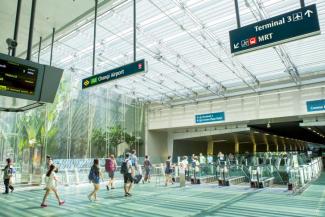
Singapore, 21 September 2016 (Wednesday) – The Institute of Service Excellence (ISES) at the Singapore Management University (SMU) today released the 2016 second quarter (Q2) Customer Satisfaction Index of Singapore (CSISG) results for the Air Transport, Land Transport, Logistics, Public and Private Education sectors.
Statistically significant upticks in customer satisfaction were seen in the Air Transport, Land Transport and Public Education sectors from 2015. Meanwhile, the Logistics and Private Education sectors saw no statistically significant change from the year before.
Within the Air Transport sector, three sub-sectors were measured: Airport, Airlines and Budget Airlines. The sector improvement was led by a marked increase in the customer satisfaction score for Changi Airport at 81.4 points (+6.28 points/+ 8.4%). Although the remaining two sub-sectors Airlines (73.5 points) and Budget Airlines (69.5 points) saw no statistically significant difference from the year before, two airlines in particular performed better than their sub-sector average. Coming in top for the Airlines sub-sector was Singapore Airlines which scored significantly better than the sub-sector average with 76.7 points, followed by Garuda Indonesia at 75.1 points which emerged as an entity to be measured in this year’s Q2 CSISG study based on high interaction incidence with consumers.
The Land Transport sector also registered a statistically significant increase in customer satisfaction with a score of 66.8 points (+3.44 points/+5.4%). Within this sector, Taxi Services scored 70.0 points (+4.07 points/ +6.2%) and Mass Rapid Transit System scored 66.4 points (+4.40 points/+7.1%), both sub-sectors saw statistically significant increases in customer satisfaction scores. A new sub-sector termed Transport Booking App was introduced for the first time this year.
“Given the recent increase in the availability and adoption of mobile apps within the land transport space, we found it timely to introduce for the first time a new sub-sector that tracks customer satisfaction in this area. Security and factors associated with ease of use of the apps were identified as key factors driving perceived quality which impacts upon satisfaction scores,” said Ms Neeta Lachmandas, Executive Director of ISES.
Uber ranked first at 69.7 points in the Transport Booking App sub-sector, followed by Grab at 69.0 points, ComfortDelGro scored 68.0 points while Other transport booking apps came in at 67.2 points. Overall, the sub-sector achieved 68.8 points for customer satisfaction.
Within the Taxi Services sub-sector, Premier came up first at 72.2 points (+5.27 points/+7.9%) followed by Transcab at 71.9 points (+4.44 points/+6.6%) and SMRT at 70.1 points (+ 3.90 points/5.9%). Within the Mass Rapid Transit System sub-sector, SBS Transit scored 66.5 points (+2.62 points/+4.1%) followed by SMRT at 66.3 points (+4.80 points/+7.8%). The Public Buses sub-sector did not see any statistically significant change from the year before.
“While hygiene factors such as ease of navigation and cleanliness are intuitively important, our study revealed that reliability of trains was identified as the top factor in driving perceptions of quality. Following closely behind are helpfulness of staff and train frequency. It appears that while commuters are driven by efficiency and effectiveness, they also value the availability of staff who could provide on-site assistance to them,” noted Mr Chen Yongchang, Head of Research and Consulting at ISES.
For Logistics, Courier Services registered a statistically significant improvement in score at 72.4 points (+2.24 points/+3.2%) whereas Postal Services, which is represented by Singapore Post, saw a statistically significant decline in customer satisfaction score at 67.9 points (-3.55 points/-5.0%), compared to 71.5 points from the year before.
The Public Education sector also improved significantly year on year with a score of 75.7 points (+1.56 points/+2.1%). Leading the pack is the Universities sub-sector with a score of 77.1 points (+1.43 points/+1.9%). This is followed by the ITE sub-sector which saw a statistically significant dip in scores to 72.5 points (-1.51 points/-2.0%) from 74.0 points the year before. The Polytechnics sub-sector on the other hand scored 71.5 points (+1.64 points/+2.3%), a change that is not considered statistically significant from the year before.
“Generally, student support services in terms of counselling, career advice and financial assistance as well as quality, dedication and mutual respect exhibited by teaching staff were found to be key quality drivers impacting upon satisfaction ratings for the education sector,” added Mr Chen Yongchang.
The CSISG 2016 Q2 study was conducted between April and July 2016. A total of 13,355 respondents were surveyed on their customer satisfaction levels.
Please refer to Annex A for a background on the CSISG, and Annex B for the detailed scores.
For media queries, please contact:
Ms Serene Ashley Chen
Senior Manager, Client Engagement & Partnerships
Institute of Service Excellence (ISES) at Singapore Management University
DID: (65) 6808 5103
Mobile: (65) 9151 9030
Email: serenechen [at] smu.edu.sg (serenechen[at]smu[dot]edu[dot]sg)
Mr Teo Chang Ching
Senior Assistant Director, Corporate Communications
Office of Corporate Communications and Marketing
DID: (65) 6828 0451
Mobile: (65) 9431 8353
Email: ccteo [at] smu.edu.sg (ccteo[at]smu[dot]edu[dot]sg)